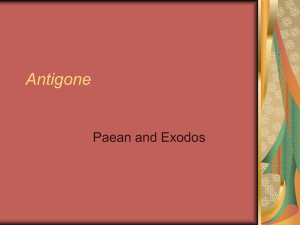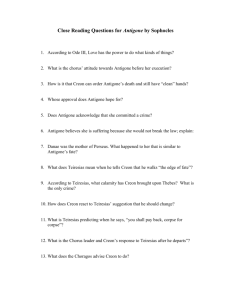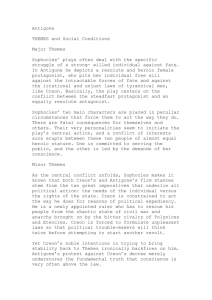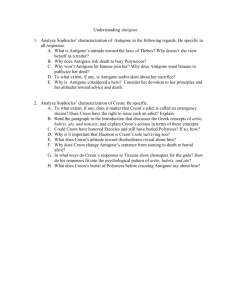File - Kyle Krichbaum`s Portfolio
advertisement
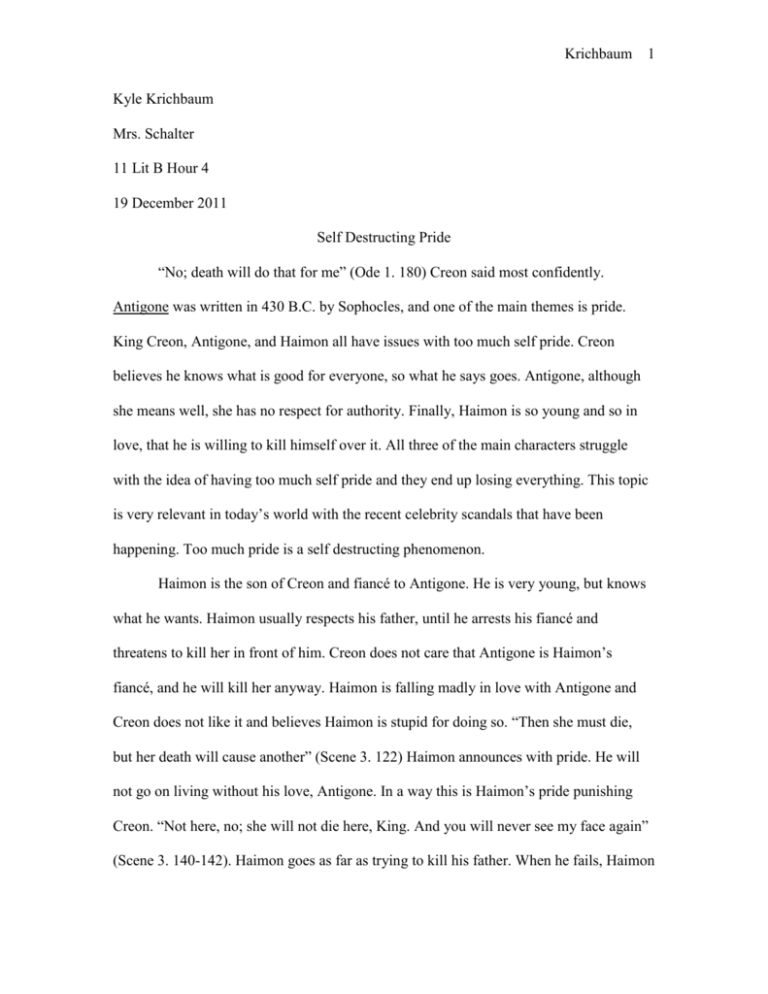
Krichbaum 1 Kyle Krichbaum Mrs. Schalter 11 Lit B Hour 4 19 December 2011 Self Destructing Pride “No; death will do that for me” (Ode 1. 180) Creon said most confidently. Antigone was written in 430 B.C. by Sophocles, and one of the main themes is pride. King Creon, Antigone, and Haimon all have issues with too much self pride. Creon believes he knows what is good for everyone, so what he says goes. Antigone, although she means well, she has no respect for authority. Finally, Haimon is so young and so in love, that he is willing to kill himself over it. All three of the main characters struggle with the idea of having too much self pride and they end up losing everything. This topic is very relevant in today’s world with the recent celebrity scandals that have been happening. Too much pride is a self destructing phenomenon. Haimon is the son of Creon and fiancé to Antigone. He is very young, but knows what he wants. Haimon usually respects his father, until he arrests his fiancé and threatens to kill her in front of him. Creon does not care that Antigone is Haimon’s fiancé, and he will kill her anyway. Haimon is falling madly in love with Antigone and Creon does not like it and believes Haimon is stupid for doing so. “Then she must die, but her death will cause another” (Scene 3. 122) Haimon announces with pride. He will not go on living without his love, Antigone. In a way this is Haimon’s pride punishing Creon. “Not here, no; she will not die here, King. And you will never see my face again” (Scene 3. 140-142). Haimon goes as far as trying to kill his father. When he fails, Haimon Krichbaum 2 commits suicide in front of him by stabbing himself with his sword. Haimon’s amount of self-pride resulted in his own death. Antigone, who is the niece of Creon and the fiancé to Haimon, is not unlike Haimon at all. Antigone has no respect for authority. “Creon is not strong enough to stand in my way” (Prologue. 36). Just like Haimon, she thinks she knows what she wants but she is so young. Antigone also has too much self-pride. Antigone knows she will likely get into trouble with the law for burying her brother’s dead body. “You shall not lessen my death by sharing it” (Ode 1. 36) she tells her sister Ismene, who is accused of helping her. Antigone does not want to share the “glory” of being put to death for properly taking care of her brother’s body. Following Antigone’s arrest she knows she will be put to death, so she ends up hanging herself while she is being kept in prison. Antigone has no respect for authority and has too much self pride, leading to her own death. Last, but certainly not least, is Creon. Creon is the King who believes he is above everyone else. Creon’s laws are do or die. “This is my command, and you can see the wisdom behind it. As long as I am King, no traitor is going to be honored with the loyal man. But whoever shows by word and deed that he is on the side of the State – he shall have my respect while he is living and my reverence when he is dead.” (Parodos. 48-53) Creon declares. Creon thinks so highly of himself that he is above the Gods and he has it made. Creon is not invincible though. When he arrests Antigone and Ismene, people start to lose respect for him. “And the city proposed to teach me how to rule?” (Scene 4. 106). When Creon threatens to kill Antigone in front of Haimon, he loses his son, and when Creon loses his son, he also loses his wife. “No; death will do that for me” (Ode 1. 180). Krichbaum 3 Finally, when he proceeds to let Antigone free, she is already dead. Creon is left alone because of his excessive amount of self-pride. In the end, Creon is left living, sorry, and alone. All things he brought onto himself because he thinks too highly of himself and his rule. In today’s world, we can see the qualities of Creon, Antigone, and Haimon reflected in celebrity, Charlie Sheen. His slogan, “Winning”, shows his amount of selfpride. However, in reality, he is a bum who lost his job, his wife, his children, and has a drug problem. This does not sound like a “winning” person based on today’s standards, nor in the time of Sophocles for that matter. It proves that the theme of self-pride being destructive is still very relevant today.
